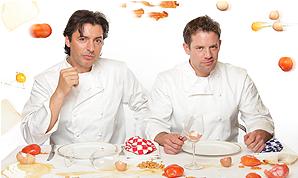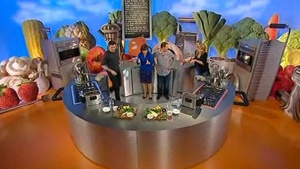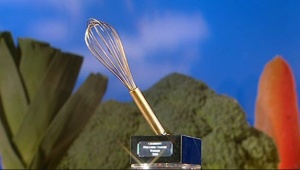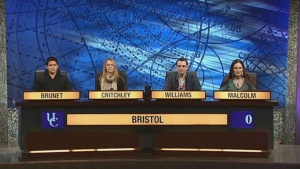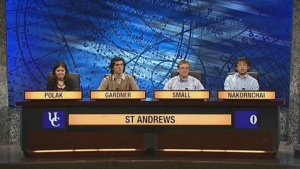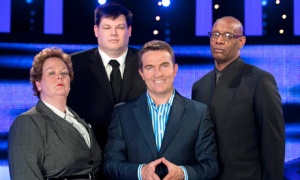Weaver's Week 2010-07-11
Last week | Weaver's Week Index | Next week
Reviews of two cookery shows this week, the first in a new series of University Challenge, and some very unusual scenes in London.
Contents |
Family Food Fight
Cineflex (Chef) / Nextfilm (Chef) / Mindshare for Channel 5, 18 May to 29 June
This is a very curious show. It's almost as if the makers have taken bits out of other cookery shows, and decided to include them, and don't actually care whether they help to make the whole programme coherent in the slightest.
Take, if we will, two families, united by a lack of faith in their ability to cook in the kitchen. We might, for instance, have a married couple whose busy jobs mean that they're dialling out for pizzas and takeaway chicken almost every night. Or we might have a mother-of-five whose idea of good food is a curry with more salt than the North Atlantic Ocean.
These families are not the stars of the show. That honour goes to Matt Tebbutt and Jean-Christophe Novelli, two professional cooks. According to the narrative put in front of us, these chefs are in competition against each other, and will do anything to make sure they win the challenge. What challenge would that be?
To make them eat in a slightly more healthy manner? Well, actually, there are no points at all for that. Not that the chefs aren't going to demonstrate how to make a less fatty and less salty version of their favourite dishes. The public education message is rammed home in a manner that we found entirely patronising. It had us muttering into our notebook about government by target, about checklists and questionnaires, about pushing a misleading ideal of normality that doesn't take individual aptitudes and lifestyles into account.
By the end of the first half, then, we have the contestants, and we have the cooks, and that's it. Why have we wasted ten minutes of our life watching a thinly-disguised piece of propaganda in favour of this week's fashions in healthy eating advice? Ah, that'll be the sponsorship arrangement. Family Food Fight is funded by a very large margarine company. In order to redress the somewhat fatty nature of their product, they've had a strategy of making their product appear healthy by association with such activities as the London Marathon. This is another outlet for the corporate PR machine, and it's very hard to forget it.
After the break comes the actual competition. Two members of each family join the chefs in the kitchen of a restaurant, where they'll be given some practice in how to make food. Lots of food, to a tight deadline. They'll each be making forty identical dishes, to serve to forty diners – some are friends and family, others are people unknown to either side.
Cue lots of shots of panicking cooks, of amateurs trying not to burn the cakes, of professionals jumping up and down with frustration. Tensions will rise, tempers will flare, there will be flashpoints and not just from the oil. Eventually, the dishes will be served to the diners, they'll vote on which main course and which sweet they preferred, and the more popular team over two rounds will be declared the winner.
So we have the amateurs-making-food elements of Can't Cook, Won't Cook and a million successor programmes, the race-against-time elements from Ready Steady Cook, the blind taste test from programmes like The Restaurant, and rows like a mild and insipid version of The Great British Rowing Competition. And that's crammed into twelve minutes of television, thanks to the corporate puffery before the break.
The net result, sad to say, is a programme that falls between two stools. It's not got the gently aspirational qualities of a Delia Smith programme: the audience is encouraged to go "oh, dear" at the plight of the contestants in the opening scenes, rather than to identify with them. It's a tremendously snobbish way of doing things, casting other people as villains so that the audience doesn't feel guilty about following the advice. It's an approach this column finds unpalatable. Unlike Delia's shows, the recipes aren't really explained, with instructions on the website deemed to be a sufficient replacement.
The actual game itself is no great shakes, nothing wrong with it, nothing particularly new about it. It's comfortable television, the broad outline of the competition is known to viewer and participant before it begins. The programme as a whole suffers dreadfully from its first half – we really did feel as though we were being lectured at – and we wouldn't wish to see more than the one-and-a-half episodes we did see.
Celebrity Pressure Cooker
Cactus for ITV, 5-9 July
Shall we start by quibbling about something in the titles? Let's get it out of our system. The show begins by showing a hand removing a lid from a large metal pot. There are no weights on the lid, it's operating at normal atmospheric tension. It's a saucepan, not a pressure cooker.
Right, glad we've got that off our chest. Lorraine Kelly is the host for this show, where she's joined by three ITV celebs. We'll see that bloke off of The Bill, there's her off of Coronation Street, and wotsisface off of I'm a Celeb. The show begins with Lorraine talking to these people about their experience of cooking, and how they may – or may not! – be halfway decent at home.
Then we have a filmed clip about today's guest chef, extolling the virtues of his restaurant, explaining how he (and in all five episodes, it was a he) does what he does. We're now five minutes into the show, 10% of the time has gone, and we're nowhere near a competitive task.
Ah, here we go. The three players are given a menial task to do, something that even the greatest of cooks needs to do, because scientists haven't yet perfected the self-peeling spud. This gives Lorraine a chance to get herself into Harry Hill's Hall of Catchphrases, with the entirely ludicrous "Three. Two. One. Stop peeling potatoes!" Ludicrous, because she doesn't actually say that; instead, her line is something entirely unmemorable. It's no "Mission on!"
Anyway, the winner of this menial task has a choice. They can either play in the first round, and choose their competitor, or elect to sit it out and go straight through to the second round. This isn't really such a choice, it's obviously good tactics to play straight away.
Round one begins with the celebrity chef describing how to make some food. There's an instructional video for viewers at home, and (inevitably) full details are up on the show's website. The celebs are given encouragement and advice to make the dish a little better, but the cook isn't allowed to give them too much help – this is celebrity cooking, not professional cooking. Whichever cook has the better dish – as judged by the chef and Lorraine – is the winner of the round.
During the cooking, the recipe instructions are displayed on a blackboard behind the contestants, and extracts are shown on screen for the viewers to follow along. It feels a bit like a karaoke cooking competition – all the ingredients are laid on for the cooks, their task is to arrange them in the proper order. But then there's an arbitrary time limit imposed, a countdown for the last 30 seconds – and promptly ignored when it expires.
So, the round one winner is through to the final. Round two is exactly the same as round one, except that it's between the loser of the first round and the person who didn't cook in it. This is the reason why it's best for the mini-task winner to play in the first round, they've got two chances of winning a round, the person they leave only has one. Other than that, and using a different dish, it's a carbon copy of the first round.
After the next break comes an interlude, in which the chef demonstrates another recipe, for the viewers at home to follow. The grand final is played between the two winners of the earlier rounds, and it does show a bit of a difference – the chefs are given ingredients brought in by the celebrity chef, and challenged to turn them into a tasty dish. Against the clock, naturally. Ready? Steady? Oh.
The daily champion wins a golden whisk. It's a normal egg-whisk, spray-painted gold. Literally no expense spent on this trophy. And we don't even get a weekly final, between the various daily champions.
Again, we find that the competition is nothing novel, celebrities cooking while being advised is the plot of Celebrity Masterchef Goes Large writ small. It's undemanding daytime filler, it might inspire a few people to broaden their culinary horizons, it might be good advertising for the chefs involved. We're just finding it bland.
University Challenge
Granada for BBC2, 8pm Monday
Round 1, Heat 1: St Andrews v Bristol
- "We go about our daily lives understanding almost nothing of the world."
The series begins with a quotation. It's answered by Bristol University, which we're told was founded in 1876 by the Fry and Wills families and now is the most oversubscribed institution in the UK. It's also been fictionalised in the book "Starter for Ten". It doesn't take long for St Andrews to get off the mark, host Jeremy "Thumper" Paxman tells us about their long walks on the pier each Sunday – and the May Day custom of jumping off said pier.
Bristol do remarkably well on a set of bonuses about incendiary devices, including the Molotov cocktail. The first visual round is on that old standby the periodic table, asking on cities that share their postcodes with chemical elements. Bristol have a narrow lead, 60-45, and their next set of bonuses is on various classes of interesting primes. We know that Thumper doesn't write these questions, because it's clear he doesn't understand them. Nor does he understand the mathematical definition of a group. Never mind, he can read them and make it sound like he does.
Greek drama helps St Andrews to close the gap, and the Hidden Transmission Indicator of the Week is a set of bonuses on African football. Apparently, there's a lot of it about. Word of the week is "osseo-sanguine-ovi-ceri-cartilagino-nervo-medullary". It sounds quite atrocious. The audio round is on the works of Vaughan-Williams. It puts St Andrews ahead, 95-80. No-one can work out the sum 2012-40, but plenty of people get the Question of the Week:
Q: Recorded by the photographer Iain Macmillan, what event of significance took place at about 11.30am on August 8th, 1969, in a road in St John's Wood?
Why is this a good question? It unpeels like an onion – if someone's familiar with Mr. Macmillan's work, or is a Beatles trivia buff, this can be correctly answered after the first clause. By the end, there are enough clues for anyone with a scanty knowledge of pop culture to guess it's the photoshoot for the Abbey Road album cover.
Bristol's dubious reward for beating the buzzers is a set of bonuses on The Anglish Moot, a website that proposes words coined from Germanic roots to replace those of Romance or Greek origin. Ten out of ten for digging up obscure question subjects. The hidden "Were they watching Only Connect" question is on the zero point for heights in Ordnance Survey maps: clearly the sides weren't, otherwise they'd remember it's Newlyn in Cornwall. Still, Thumper is able to ask for the location of the Moulin Rouge cabaret, an enquiry we rather hoped he'd make in his own time.
Visual round two is Name That Animal, in which everyone mistakes a water vole for some sort of mouse. We don't think that's a compliment. Bristol has a lead, 125-95. A bat with long ears? Of course it's a long-eared bat! That goes to St Andrews, as do legends of national saviours – Drake's Drum, King Arthur, and the Seven Sleepers of Ephesus. The Saints go on to solve a question on acceleration, and get bonuses on words that use every vowel once only. It's as if Bamber "Bambi" Gascoigne were still in the chair.
Just when we thought St Andrews would run away with it, Bristol pick up a starter. Then they zig with Alice in Wonderland when they should have zagged with Through the Looking Glass, and St Andrews leap further ahead. But Bristol won't be denied, they get the next starter, a couple of bonuses, another starter, and bonuses on Henry VII's relatives. There's another Hidden Transmission Indicator, on 4th of July celebrations. Bristol pull level with Chopin's Minute Waltz, and ahead with Tchaikovsky, with seconds to play. A question on Mohs scale arithmetic is missed by both sides, and that wraps up the game. Bristol have won, 190-185.
A very even week from both sides, with every player answering at least one starter correctly. Lucinda Critchley of Bristol had four; Sophie Polak and Tagore Nakornchai three each for St Andrews. The bonus conversion rates were St Andrews 19/27, Bristol 16/33, and the overall accuracy 55/87.
One question left hanging: Which modern wind instrument is a development of the medieval shawm? It's the oboe.
Next week: Cardiff v Oxford Brookes
This Week And Next
Celador Productions won US$269m (£177m) in damages from Disney Corp. Celador said that Disney had failed to pay the full amount owed for licensing the Who Wants to be a Millionaire format from the company, and had used dubious accounting practices to squirrel money away. Disney said that it would appeal against the decision.
Nominations were announced for the (US) National Academy of Television Arts and Sciences awards this week. UK nominees were rather thin on the ground, NATAS tends not to believe that there's anything of merit produced overseas. Still, ITV is up for a nod, Hell's Kitchen has been nominated in Outstanding Art Direction for a Multi-Camera Series. The BBC's Ballroom With the B-List is up for a fair few awards – Outstanding Reality Competition show is the biggest, there are a couple of nods in the Outstanding Choreography category, Tom Bergeron's up in Outstanding Host for a Reality or Reality-Competition, and there's a chance of the show winning the utterly prestigious award for Outstanding Hairstyling for a Multi-Camera Series or Special.
The week to 27 June had football and tennis all over the schedules, and given the lack of opposition, Big Brother proved the nation's favourite gameshow. 2.65m people tuned in on Tuesday night to see Shabby being nice to Ben, and having a lovely meal. In second place, a surprise: ITV's top-rated game show was The Chase. 2.3m people stayed after seeing Italy lose some football on Thursday to see what all the fuss was about, and we hope some of them liked what they saw. It's the first time in at least twelve years that a teatime quiz has made ITV's weekly top 30. Third place went to Mock the Week (2.15m on Thursday night).
On the digital channels, we don't have ratings for More4, and ITV2 found that Britain didn't like Britain's Got Talent US, as it's entirely absent from the top ten. QI on Dave had the top score available to us, 460,000; Living's Four Weddings (400,000) and Dave's Mock the Week (365,000) rounded out the top three.
Returning to the chart-topping Big Brother, and attention inside the set has been dominated by challenges against robots, featuring an overgrown children's toy. It's the sort of thing that will inspire Laura Grant when she's born in a few years. There's also been discussions about the foreign policy achievements of Neville Chamberlain. So far, so normal.
Outside the set, a very strange thing has been happening. Shabby Katchadourian left the contest last Monday afternoon, and indicated within a day that she was regretting her decision. By Thursday, she was leading a huge group of fans in central London, wearing a sandwich board, and campaigning for her own reinstatement in the programme.
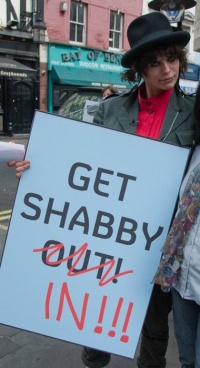 They'll ask Have I Got News for You hosts to be the city mayor next.
They'll ask Have I Got News for You hosts to be the city mayor next.
This is unusual: agitation for an erstwhile contestant to be re-admitted to the contest has generally been confined to the more ludicrous internet message boards. It's clear that the idea has support amongst the core audience of young women, who admire her fashion and spirit, and would enjoy her company.
What is completely unprecedented is that the event was filmed for Big Brother's Little Brother, suggesting the campaign has support amongst the senior producers. Is this a tester for Shabby to appear in the All-Star finale next month? Is this a BAFTA-worthy acting job? Are we being sucked into a master plan to give Big Brother publicity by writing about it? Is this a conspiracy that's already gone completely off-script? Are we sniffing a conspiracy where none exists? Gaaaah! Our head hurts!
Next week's Week is going to be an experiment, as we watch, listen to, and review five hours of game shows going out on Monday evening, starting with ITV's most popular game show The Chase, ending with the nation's favourite Big Brother, and commenting on six other programmes in between. We literally have no idea what's going to happen.
The end of the football means that interesting shows can go out on weeknights again – Shooting Stars (BBC2, 9.30 Tuesday) and Dragons' Den (BBC2, 9pm Wednesday) return for new runs, as does CBBC's science show Blast Lab (5.15 Wednesday). Channel 4 has an extended interview with Wilnelia Merced, the wife of Bruce Forsyth ("Living with Brucie", 9pm Wednesday). Saturday night gains guessing game Odd One In (ITV, 7.15), variety show Talking Telephone Numbers .... er, er, Magic Numbers (ITV, 8pm), and the unfathomable second series of Tonight's the Night (BBC1, 8pm).
To have Weaver's Week emailed to you on publication day, receive our exclusive TV roundup of the game shows in the week ahead, and chat to other ukgameshows.com readers, sign up to our Yahoo! Group.


